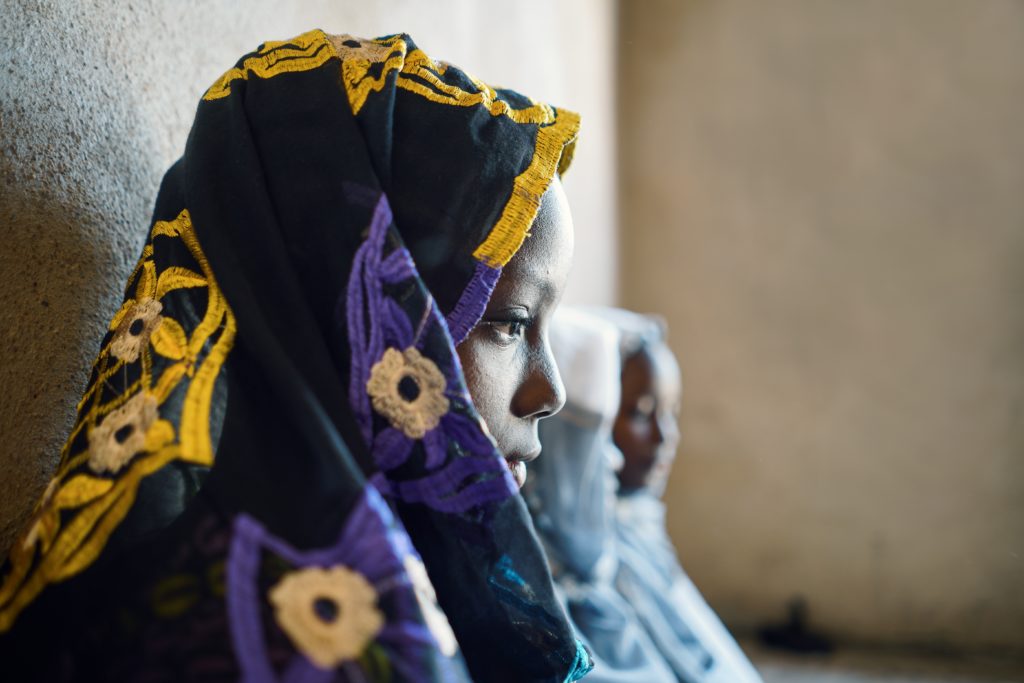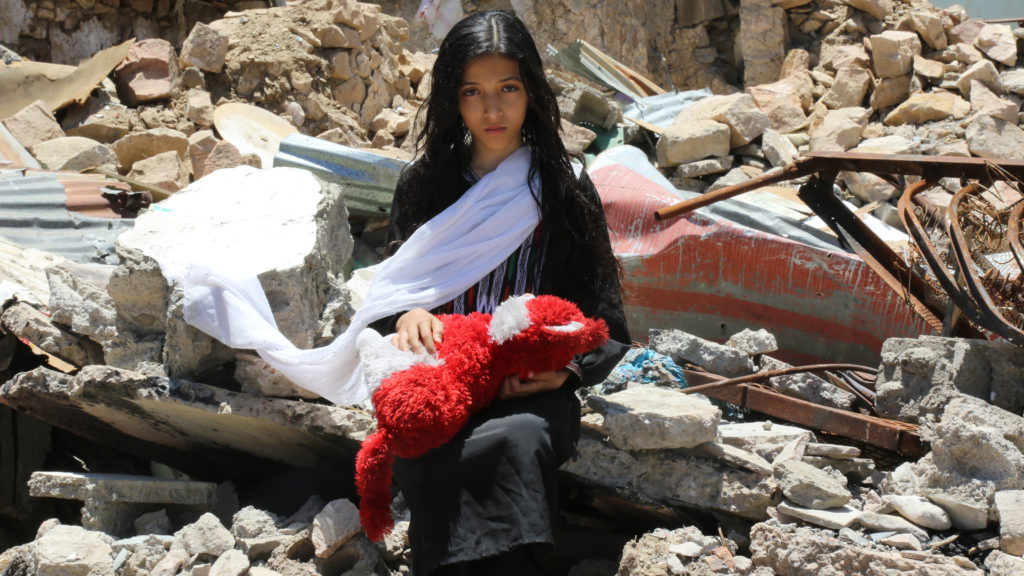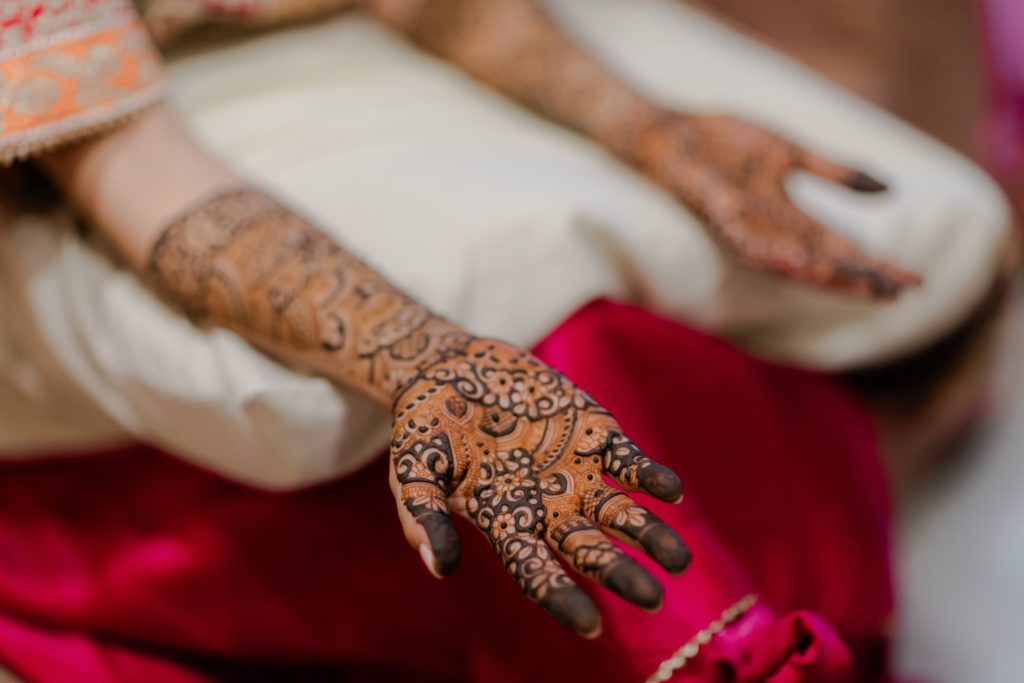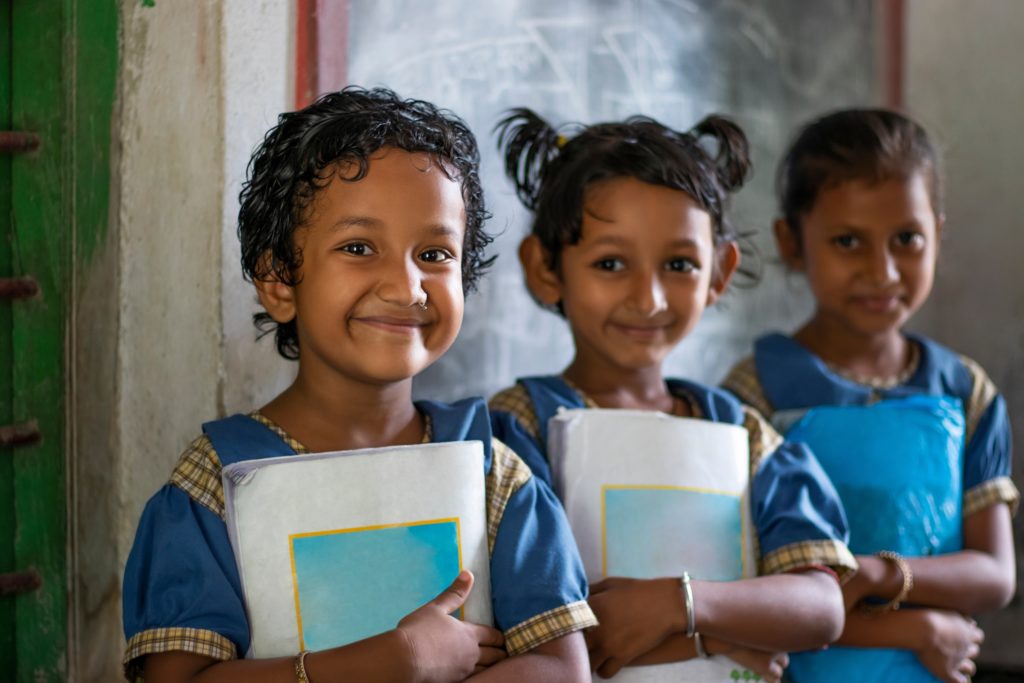Child marriage, or formally known as ‘child, early and forced marriage (CEFM)’ is a term driven and enabled by a multitude of intersecting factors, most of which are tied to broader societal norms and conditions. Children are especially vulnerable to CEFM when their physical security and wellbeing is at risk: poverty, conflict, forced displacement, environmental disasters and health crises are common drivers of instability. In addition, inequality and gender imbalances further expose children, specifically young girls, to a greater risk of CEFM.

Defining child, early and forced marriage
Internationally, child, early and forced marriage (CEFM) is defined and understood as any formal or informal union involving at least one person under the age of eighteen. However, this international stance is not reflected in domestic legislation as many countries still permit marriages before the age of eighteen or fail to enforce preventative laws. Child marriage is further complicated by customary or religious laws which undermine legal provisions and normalize the marriage of children (Wodon et al, 2017).
Drivers of child, early and forced marriage
Despite laws and regulations protecting children, CEFM still exists. Globally, there are numerous reasons children are pushed into CEFM, with poverty being the greatest driving force. Global research generally categorizes the drivers of CEFM into ‘push and pull’ factors: occurrences that push children into CEFM and others which entice children and their families to enter CEFM consensually (Presler-Marshall et al, 2020). Among other factors, CEFM is primarily driven and enabled by:
Poverty
Poverty-driven CEFM is a consequence of financial pressures that make families turn to marriage to alleviate this burden. This mostly affects girls, as they are often viewed as an economic burden on families and, due to deep-rooted gender inequities across the world, are less likely to be income-earners (Girls Not Brides, n,d).
Education
The quality and accessibility of education are fundamental in building resilience against CEFM. Children who have limited access to education and awareness, are less likely to know all the dangers that come of child marriage. These children also have limited career opportunities, which in turn leads to a desperation to gain income. Furthermore, poor quality or a lack of education can also leave children vulnerable to abuse by normalizing discriminatory practices and abuse (Girls Not Brides, n,d).
Sexual and gender-based violence against women and girls
Young girls are disproportionately affected by gender-based violence in patriarchal societies. In regard to their education, this violence can lead to girls dropping out of school and creating new cycles of abuse and desperation. Gender-based violence can also normalize patterns of abuse and subordination, thus paving the way for abusive CEFM (Girls Not Brides, n,d).
Inadequate legal frameworks
Due to the principle of legal sovereignty, countries have wide discretion over establishment and implementation of local legislation. As a result, many countries have not outlawed CEFM and those that have, do not always support law enforcement bodies to implement those laws (Presler-Marshall et al, 2020).
In the Hamas-ruled Gaza Strip, the legal age of marriage has recently been lifted to eighteen, however religious exemptions are likely to mean this provision is ineffective. Similarly in Bangladesh a legal loophole means courts can allow CEFM on an exceptional basis, undermining the effectiveness of the law (Presler-Marshall et al, 2020).
Humanitarian crises and conflict

National conflicts, crises, disasters and organized criminality can push children into desperate situations and drive CEFM. Girls are most likely to be negatively affected by instability in this way as organized Crime Groups (OCGs), such as human traffickers, target them for exploitation more than boys.
Girls are also less likely to return to school following internal conflicts and disasters (Girls Not Brides, n,d). Research studying times of conflict has also shown a more accepting culture towards ‘riskier’ grooms as families are desperate to ensure their daughters are not left unmarried (Presler-Marshall et al, 2020).
Family honor
Cultural perceptions about the role of women in society, and the importance of marriage, can drive CEFM. Research indicates that young girls are often forced into CEFM to protect family honor and maintain their social standing. This is especially the case in societies that view being a young, single woman as shameful, or where young girls have relationships or have fallen pregnant – affecting their perceived sexual purity (Miedema et al, 2021).
Gender norms
CEFM is, at its core, enabled by the belief that girls are commodities to be traded and assigned. These social norms that perceive girls like so, make it much easier for CEFM to be justified in the name of preserving their integrity (Preseler-Marshall et al, 2020).
Female genital mutilation and cutting (FMG/C)
FGM/C, like CEFM, is driven by inequitable gender norms. As a result, countries with high prevalence rates of FGM also often have high rates of CEFM. Nine countries are in the top 20 list for both child marriage and FGM. These nine countries include: Burkina Faso, Ethiopia, Central African Republic, Liberia, Somalia, Mali, Nigeria, Mauritania and Guinea (Girls Not Brides, n,d).
Religion
CEFM is often linked to multiple religions and is enabled by religious leaders who facilitate religious ceremonies. While it is common for CEFM to be associated with Islam, the practice occurs and is justified by other religious beliefs in Hinduism and Catholicism among other faiths (Girls Not Brides, 2017).
COVID-19
School closures and increased economic hardships during the COVID-19 pandemic drove more children, and girls in particular, towards CEFM as families sought to alleviate their financial burden and provide better economic opportunities for their children (Girls Not Brides, n,d).
Climate change
Several locations with a high prevalence of CEFM are also suffering from the most severe effects of climate change. Families in rural locations are potentially at risk of accessing natural resources and water. The absence of healthy natural resources and wildlife can lead to livelihoods getting destroyed for communities that depend on those ecosystems. Natural disasters and crises can also lead to forced displacement, pushing families away from their homes, and children into economic desperation, and away from education (Presler-Marshall, 2020).
Global prevalence of child, early and forced marriage

Even though concrete statistics on the global scale of CEFM are hard to find, the United Nations Office for the High Commissioner of Human Rights has conducted research on the regional prevalence of the harmful practice. This research presents the following breakdown of locations per instance of CEFM (OCHR, n,d):
- Sub-Saharan Africa: 18%
- Middle East and North Africa: 5%
- South Asia: 44%
- East Asia and the Pacific: 12%
- Latin America and the Caribbean: 9%
- Other regions collectively: 12%
Global and regional commitments and reporting mechanisms to ending child, early and forced marriage
Governments across the world are committing to end child, early and forced marriage by prioritizing and addressing the root causes of CEFM. These commitments are demonstrated through a non-exhaustive list of major international treaties and agreements:
Sustainable Development Goals
There are several United Nations Sustainable Development Goals (SDG) that are of importance to ending CEFM such as: Goal 1 (no poverty), Goal 2 (zero hunger), Goal 3 (good health and wellbeing), Goal 4 (quality education), Goal 5 (gender equality), Goal 8 (economic growth), Goal 10 (reduce inequalities) and Goal 16 (peace, justice and strong institutions) (Girls Not Brides, 2020). In addition to these goals, Target 5.3 specifically identifies the need to “eliminate all harmful practices, such as child, early and forced marriage and female genital mutilation.”
United Nations General Assembly Resolution
In November 2020 the United Nations adopted a General Assembly Resolution on CEFM, in support of the Human Rights Council Resolution on CEFM in times of crisis. Among other notable developments, the resolution reemphasizes the vulnerability of children and girls in particular, while simultaneously calling for greater sexual education. The resolution calls on all UN Member States to ensure CEFM is prohibited by law, establish enforcement capabilities to implement these provisions and provide equitable education for all to ensure girls are not neglected or discriminated against (Girls Not Brides, 2022).
Ministerial Commitments
Across the globe, governments have established mechanisms to combat CEFM, backed by parliamentary support.
Nairobi Summit on ICPD25
In 2019, Kenya and Denmark convened a high-level conference in support of the ICPD agenda. This included week-long events designed to promote universal access to sexual health education, end gender-based violence and protect reproductive health care, among other agenda items (International Institute for Sustainable Development, 2019).
The Girl Summit on Ending Female Genital Mutilation and Cutting and Child, Early and Forced Marriage
Many public-facing international efforts to outlaw child marriage build on the Girl Summit from 2014. During this UK-hosted conference, hundreds of international stakeholders and government actors came together to discuss ways to mobilize funding to bring an end to child marriage and female genital mutilation (Foreign and Commonwealth Office, 2015).
African Union Campaign to End Child Marriage in Africa
Regionally, and following the Girl Summit, the African Union ran a three-year awareness-raising campaign (2014-2017) to support existing efforts to end child marriage and shine a light on the scale of the problem across the African continent (African Union, 2013).
Eliminating and preventing child, early and forced marriage
The multidimensional nature of the CEFM challenge necessitates an equally diverse response. At a macro-level, countries should work to structure their CEFM response around five key pillars (Presler-Marshall et al, 2020).
The empowerment of young girls
Girls should be supported to attend and remain in permanent education, including through welfare assistance programs, to ensure they have equal economic opportunities and are aware of the dangers associated with gender-based discrimination. In working to achieve this goal, policymakers should provide safe spaces for girls to learn, play and interact with other children, including boys. This will enable healthy physical and mental development of the girl child (Presler-Marshall et al, 2020).
Engage and work with families
Lawmakers and policymakers should work directly with children’s families to educate parents on the value of their children and prevent the perpetuation of negative norms and stereotypes. Behavior change campaigns can also be used to dismantle patriarchal ways of thinking and demonstrate the value of diversity and agency (Presler-Marshall et al, 2020).
Engage and work with local communities
Efforts to eradicate child marriage will only be successful if they receive the buy-in of local communities. CEFM is often driven and made possible by community belief systems. Those with more agency within the community such as faith leaders and traditional leaders should be targeted as entry points to raise awareness of the dangers of child marriage and lead efforts to end the practice (Presler-Marshall et al, 2020).
Develop better data-driven tools to study and respond to CEFM trends
CEFM is a global phenomenon, with limited concrete data on its prevalence. The absence of clear monitoring systems on child marriages makes it difficult for humanitarian actors to react to emerging trends and developments in the field. As such, responses to the practice may be outdated or inappropriate for the contexts in which they are applied (Presler-Marshall et al, 2020).
Mobilize existing national and regional legal frameworks
Humanitarian actors working to end child marriage do not need to reinvent the wheel entirely. Many national legal frameworks and enforcement bodies possess the capacity to outlaw the practice with better training.
Efforts should be made to work with local authorities to mainstream good practice. For instance, law enforcement actors can be supported with advice on how to detect child marriage power dynamics; or judges and magistrates could receive training on the implementation of child marriage laws and their effect on child development (Presler-Marshall et al, 2020).
Key documents and international legal instruments

- United Nations Convention on the Rights of the Child (1989)
- The African Charter on the Rights and Welfare of the Child (1990)
- Convention on the Elimination of All Forms of Discrimination Against Women (1979)
- Protocol to the African Charter on Human and People’s Rights (Banjul) (1981)
- Protocol to the African Charter on Human and People’s Rights on the Rights of Women in Africa (2003)
- Southern African Development Community Protocol on Gender and Development (2008)
- Universal Declaration of Human Rights (1948)
- Convention on Consent to Marriage, Minimum Age for Marriage and Registration of Marriages (1964)
- International Covenant on Economic, Social and Cultural Rights (1966)
- International Covenant on Civil and Political Rights (1966)
Written by Vanessa Cezarita Cordeiro
Internally proofread by Aditi Partha
Last updated on 2 August 2023
References:
African Union. (2013, November). “Campaign to end child marriage in Africa: Call to action.” Retrieved from African Union, accessed on 19 August 2023.
End Violence Against Children. (2022, May 20). “How climate change is driving child marriage.” Retrieved from End Violence Against Children, accessed on 18 August 2023.
Foreign and Commonwealth Office. (2015, March 12). “Case study from the 2014 human rights and democracy report: The Girl Summit – ending female genital mutilation and child, early and forced marriage.” Retrieved from Foreign and Commonwealth Office UK, accessed on 18 August 2023.
Girls Not Brides. (2017, December 18). “8 child marriage myths that need to go.” Retrieved from Girls Not Brides, accessed on 20 August 2023.
Girls Not Brides. (2020, July). “SDGs and child marriage.” Retrieved from Girls Not Brides, accessed on 18 August 2023.
Girls Not Brides. (2022, November 29). “UN General Assembly adopts resolution on child, early and forced marriage.” Retrieved from Girls Not Brides, accessed on 17 August 2023.
Girls Not Brides. (n,d). “Common drivers of child marriage and a lack of quality education for girls.” Retrieved from Girls Not Brides, accessed on 20 August 2023.
Girls Not Brides. (n,d). “Common drivers of child marriage and a lack of quality education for girls.” Retrieved from Girls Not Brides, accessed on 17 August 2023.
Girls Not Brides. (n,d). “FGM/C and child marriage.” Retrieved from Girls Not Brides, accessed on 20 August 2023.
International Institute for Sustainable Development. (2019, November). “Nairobi Summit on ICPD25.” Retrieved from SDG Knowledge Hub International Institute for Sustainable Development, accessed on 18 August 2023.
Miedema, E., Koster, W., Sotirova, A., Meyer, P., Pouw, N. (2021, January 31). “The struggle for public recognition: Understanding early marriage through the lens of honour and shame in six countries in South Asia and West Africa.” Volume 20, Issue 4. Retrieved from Sage Journals Publications, Progress in Development Studies, accessed on 20 August 2023.
Presler-Marshall, E., Jones, N., Alheiwdi, S., Youssef, S., Abu Hamad, B., Bani Odeh, K., Baird, S., Oakley, E., Guglielmi, S., & Malachowska, A. (2020, December). “Through their eyes: exploring the complex drivers of child marriage in humanitarian contexts.” Retrieved from Gender and Adolescence: Global Evidence, accessed on 19 August 2023.
United Nations Human Rights Office of the High Commissioner. (n,d). “Child and forced marriage, including in humanitarian settings.” Retrieved from United Nations Human Rights Office of the High Commissioner, accessed on 20 August 2023.
Wodon, Q., Tavares, P., Fiala, O., Le Nestour, A., Wise, L. (2017, October). “Ending child marriage: Child marriage laws and their limitations.” Retrieved from Save the Children, accessed on 19 August 2023.

